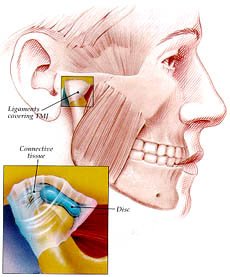TMJ Therapy
Relieve Pain on Your Chewing Muscles and Joints With TMJ Therapy
Jaw joint is also called Temporo-Mandibular Joint or T.M.J for short. Your TM joint is the most important joint in the head and neck area and is very versatile in the movements it can perform – which are beyond the capabilities of any other joint in the body.
You might have symptoms ranging from clicking, popping, pain, ear pain, sore jaw muscles, difficulty opening wide, headaches, locking joints, aching teeth, difficulty chewing and eating, neck pain or other challenges that can be attributed to TMJ problems. In some cases, it may not be the joint itself but other elements such as wisdom teeth, clenching and sleep – grinding, muscle soreness or the effects of missing teeth that can cause similar symptoms.
The pain can be very varied amongst individuals. It may be dull, sharp and searing, almost constant, sometimes intermittent or radiating and can hurt over the joint, immediately in front of the ear, but pain can also radiate elsewhere.This can often causes spasms in the adjacent muscles that are attached to the bones of the skull, face, and jaws. Pain can be felt at the side of the head (the temple), the cheek, the lower jaw, and the teeth.

Sometimes these problems may be due to trauma as a child (when the joint is developing and growing), problems in the structure of the joint itself (pathology), trauma due to impact as an adult, clenching and night –grinding (called Bruxism) or even abnormalities in your bite and the way your teeth meet. Problems with the way your teeth fit together occur in many different ways. Some bite problems cause discomfort or even pain, and that pain can masquerade as problems that you would not readily associate with your teeth. Some bite problems can cause major damage to your teeth without producing any obvious discomfort till years later.
Sometimes these can be corrected with the use or a “night-guard” or “NTI appliance” for bruxing (night time grinding) or clenching. If the problem is more severe, we will refer you to a specialist for further evaluation.











Designed and Developed by Identity Namebrands Inc.
Home | Meet the Doctors | Reviews | Our Office | Contact Us | Office Policies © 2009 Vaughan Smiles.
MAIN NAVIGATION
© 2009 Vaughan Smiles.